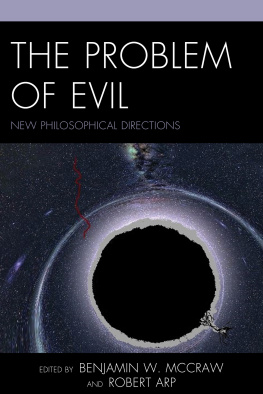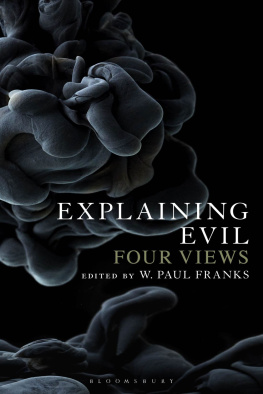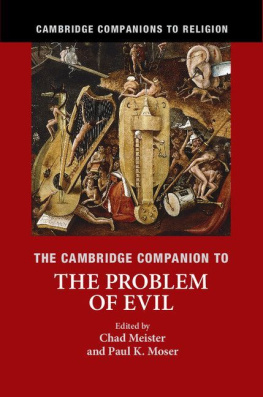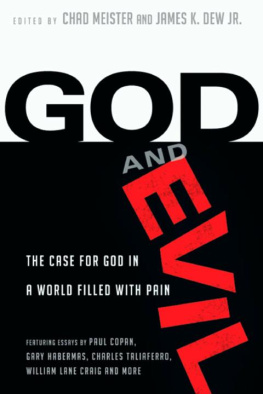Chad V. Meister - God and the Problem of Evil: Five Views
Here you can read online Chad V. Meister - God and the Problem of Evil: Five Views full text of the book (entire story) in english for free. Download pdf and epub, get meaning, cover and reviews about this ebook. year: 2017, publisher: InterVarsity Press, genre: Religion. Description of the work, (preface) as well as reviews are available. Best literature library LitArk.com created for fans of good reading and offers a wide selection of genres:
Romance novel
Science fiction
Adventure
Detective
Science
History
Home and family
Prose
Art
Politics
Computer
Non-fiction
Religion
Business
Children
Humor
Choose a favorite category and find really read worthwhile books. Enjoy immersion in the world of imagination, feel the emotions of the characters or learn something new for yourself, make an fascinating discovery.

- Book:God and the Problem of Evil: Five Views
- Author:
- Publisher:InterVarsity Press
- Genre:
- Year:2017
- Rating:3 / 5
- Favourites:Add to favourites
- Your mark:
- 60
- 1
- 2
- 3
- 4
- 5
God and the Problem of Evil: Five Views: summary, description and annotation
We offer to read an annotation, description, summary or preface (depends on what the author of the book "God and the Problem of Evil: Five Views" wrote himself). If you haven't found the necessary information about the book — write in the comments, we will try to find it.
God and the Problem of Evil: Five Views — read online for free the complete book (whole text) full work
Below is the text of the book, divided by pages. System saving the place of the last page read, allows you to conveniently read the book "God and the Problem of Evil: Five Views" online for free, without having to search again every time where you left off. Put a bookmark, and you can go to the page where you finished reading at any time.
Font size:
Interval:
Bookmark:
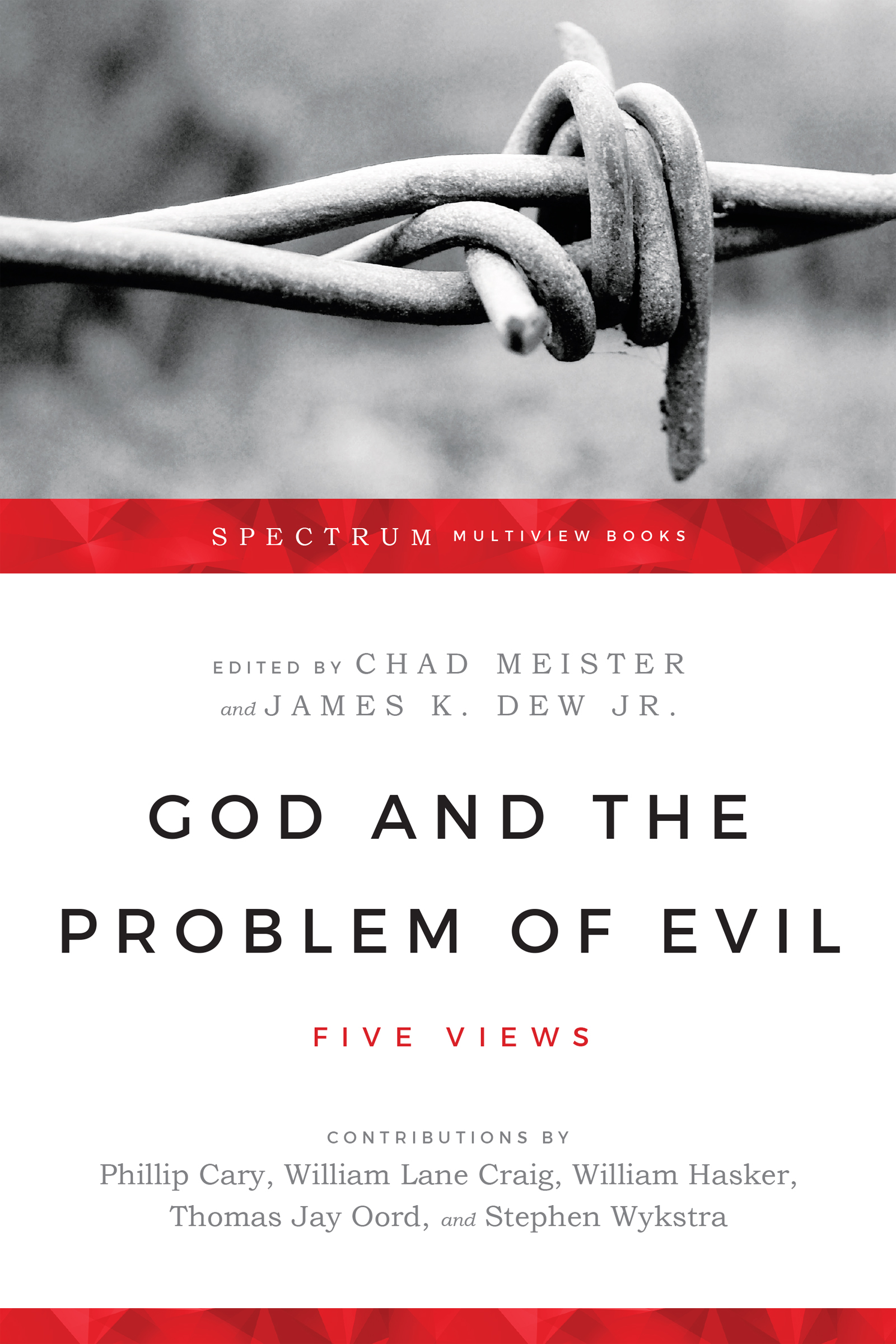
InterVarsity Press
P.O. Box 1400, Downers Grove, IL 60515-1426
ivpress.com
2017 by Chad V. Meister and James K. Dew Jr.
All rights reserved. No part of this book may be reproduced in any form without written permission from InterVarsity Press.
InterVarsity Press is the book-publishing division of InterVarsity Christian Fellowship/USA , a movement of students and faculty active on campus at hundreds of universities, colleges, and schools of nursing in the United States of America, and a member movement of the International Fellowship of Evangelical Students. For information about local and regional activities, visit intervarsity.org .
All Scripture quotations, unless otherwise indicated, are taken from THE HOLY BIBLE, NEW INTERNATIONAL VERSION , NIV Copyright 1973, 1978, 1984, 2011 by Biblica, Inc. Used by permission. All rights reserved worldwide.
Figure 1: Used by permission of Mission Frontiers magazine published by Frontier Ventures. The chart originally appeared in the November 1990 edition of Mission Frontiers on page 18. Page number refers to print edition.
Cover design: David Fassett
Images: Clayton Bastiani / Trevillion Images
ISBN 978-0-8308-9174-0 (digital)
ISBN 978-0-8308-4024-3 (print)
Library of Congress Cataloging-in-Publication Data
Names: Meister, Chad V., 1965- editor.
Title: God and the problem of evil : five views / edited by Chad Meister and
James K. Dew Jr.
Description: Downers Grove : InterVarsity Press, 2017. | Series: Spectrum
multiview books | Includes index.
Identifiers: LCCN 2017000165 (print) | LCCN 2017008459 (ebook) | ISBN
9780830840243 (pbk. : alk. paper) | ISBN 9780830891740 (eBook)
Subjects: LCSH: Theodicy. | God--Christianity. | Good and evil--Religious
aspects--Christianity.
Classification: LCC BT160 .G58 2017 (print) | LCC BT160 (ebook) | DDC
231/.8--dc23
LC record available at https://lccn.loc.gov/2017000165

Evil abounds. Regardless of when or where we lookin the feudal systems of the Middle Ages or the cyber world of the twenty-first century, in the posh suburbs of a major city or the poor slums found across the globe, in the practice of organized crime or the peccancy in organized religionin all times and in all places we find pain, we find suffering, we find evil. Evil is no less present, no less pernicious, and no less perplexing in the modern world than it has ever been. This poses a tenacious problem for those who believe in a God who is perfectly good and loving, all-powerful, and infinitely smart. For surely a God who is good and loving would not want there to be widespread pain and suffering in the world. And surely a God who is omniscient and omnipotent could ensure that no such world would exist. But such a world does exist. Our world.
In a world like ours, the adherents of traditional theism face the burden of attempting to offer a reasoned response to this problem of evil. At least the editors and contributors of this book believe that theists face such a burden, and that is why we have crafted it. By traditional theism we are referring to the conventional view of God historically held within the Judeo-Christian faith. On this view God is generally understood to be personal (or at least not less than a person: one who possesses mind and will, has goals and plans and purposes, and so on), ultimate reality (the source and ground of all things), distinct from the world yet actively involved in the world (creator and sustainer), and worthy of worship (wholly good, having inherent moral perfection, and excelling in power). This theistic concept of God includes a cluster of properties, and the ones most relevant to our discussion of evil are omnibenevolence, omnipotence, and omniscience. It is important to note that there are intramural debates within Christian theism about the meanings of these attributes. Some of these debates are reflected in the contributions to this volume. Yet all of the contributors affirm the grand wisdom, knowledge, goodness, and power of the God of historic Christianity.
We (the editors) have chosen five leading Christian thinkers who embrace five different perspectives to present in clear and accessible prose what they take to be the best way to respond to what is called the problem of evil. Before exploring their responses to the matter, it will be helpful to cover some of the relevant background material and major terms and concepts involved in the contemporary discussion on the subject.
To begin, what does the term evil connote? Evil is not an easy term to define in a precise and comprehensive manner. It is used in such diverse ways that one might wonder whether there truly is a singular meaning that captures each and every example of its usage. One might say, for example, that Joseph Stalin was an evil man, that the 2004 tsunami in Indonesia was an evil event, that an ISIS prison is an evil place, and that evolution in the animal kingdom (nature red in tooth and claw, to quote the poet Alfred Lord Tennyson) is an evil process. But what is an accurate meaning of the term evil that covers each of these examples and the countless others that could be included? Lexicons and dictionaries offer little help in this way by telling us, for example, that evil is the opposite of good or that which is morally reprehensible. Here, as with many other instances, the standard dictionary definition of the term falls short of capturing the depth, complexities, and variegations of the way the term is actually used. (A similar problem exists with the word good , for one might have a good pet, a good dinner, a good relationship, a good job, and a good God.)
While a useful, specific definition of the term evil might elude us, we can still have a sense of what we are talking about when we use it in various contexts. General descriptions such as those mentioned above can prove helpful. David Hume provides a few more: Were a stranger to drop on a sudden into this world, I would show him, as a specimen of its ills [that is, its evils], a hospital full of disease, a prison crowded with malefactors and debtors, a field of battle strewed with carcasses, a fleet foundering in the The list of evils is endless, and it includes such broad notions as pain (physical states in which one wishes his or her circumstances were otherwise), suffering (mental states in which one wishes his or her circumstances were otherwise), and injustice (unfairness, the violation of the rights of others, and uncorrected abuse, neglect, or malfeasance).
Beyond these general categories and examples, there are also classifications of evil. A standard classification divides evil into two types: moral and natural. Moral evils are those evils that are in some sense the result of a person who is morally blameworthy of the resultant evil. There was intention behind the event, and the persons free will was involved. Some moral evils are very great, as in the horror of child abuse. Other examples include genocide, torture, and other terrors inflicted on humans (or perhaps other animals) by other humans. There are also less severe types of moral evils, such as stealing or speaking very negatively about someone. Furthermore, certain defects in ones character are also often counted as moral evils, including dishonesty, greed, and gluttony.
The second category of evil has to do with naturally occurring events or disasters rather than with moral agents. Examples of natural evils include hurricanes, tornadoes, earthquakes, tsunamis, famine, illnesses such as leukemia and Alzheimers disease, disabilities such as deafness and blindness, and other terrible events that do harm to humans and other living creatures but for which no personal agent is responsible. Consider the tsunami noted above that occurred in Indonesia. Because of that event, over 250,000 people died. Countless others were left homeless or without fathers, mothers, siblings, and other loved ones. In times past such instances of uncontrollable natural forces have often been referred to as acts of God (notably in insurance claims), though more recently they are often referred to as acts of nature. In any case, such events are natural in the sense that no human person is culpable for them, and they are evil in the sense that harm was incurred to humans or other animals.
Font size:
Interval:
Bookmark:
Similar books «God and the Problem of Evil: Five Views»
Look at similar books to God and the Problem of Evil: Five Views. We have selected literature similar in name and meaning in the hope of providing readers with more options to find new, interesting, not yet read works.
Discussion, reviews of the book God and the Problem of Evil: Five Views and just readers' own opinions. Leave your comments, write what you think about the work, its meaning or the main characters. Specify what exactly you liked and what you didn't like, and why you think so.




